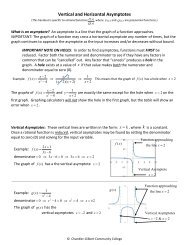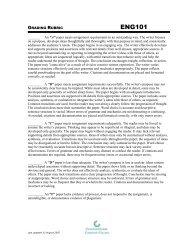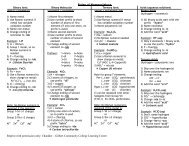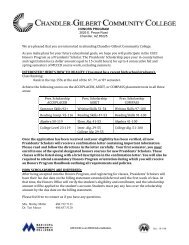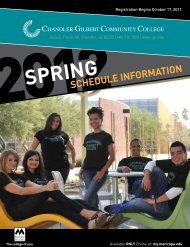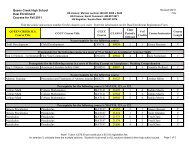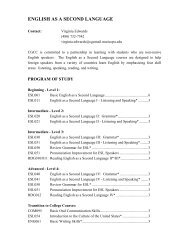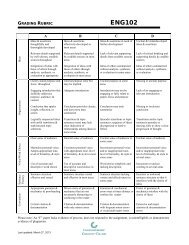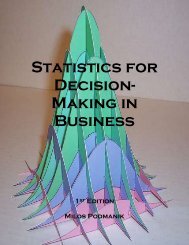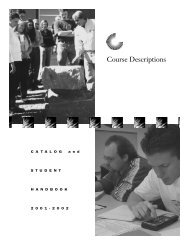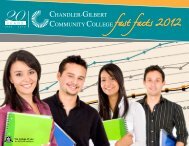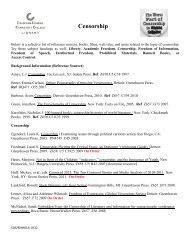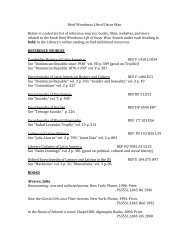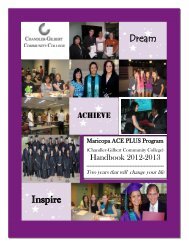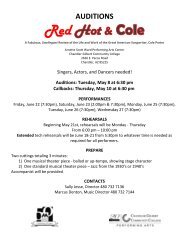Tutor Training Manual.indd - Chandler-Gilbert Community College
Tutor Training Manual.indd - Chandler-Gilbert Community College
Tutor Training Manual.indd - Chandler-Gilbert Community College
Create successful ePaper yourself
Turn your PDF publications into a flip-book with our unique Google optimized e-Paper software.
24<br />
Memory<br />
To help visual memory also use color, diagrams, cartoons, tactile association, visualization<br />
techniques, mnemonics to help draw relationships. Use tests to illustrate information.<br />
Organize information in clusters, or use association to increase memory. Write everything<br />
down for this student. To help with auditory memory explain information in a step-by-step<br />
format and encourage the student to use a tape recorder. Encourage the student to read or<br />
talk information aloud and to tape record what needs to be remembered. Pronounce words<br />
and define vocabulary.<br />
Test Taking<br />
Use old tests in tutoring sessions. Examine the wording of the test questions and use that in<br />
tutoring. For example if the instructor uses lists, definitions, theories, graphs, comparisons,<br />
illustrations, or descriptions in the test questions explain information in these terms. Draw<br />
comparisons to students’ notes. If the instructor uses essay questions have students write<br />
out answers for you or bring in old essays to show as examples. Emphasize that students<br />
may dump information prior to a test. Encourage students to answer easy questions first<br />
and as well as reading questions very carefully.<br />
<strong>Tutor</strong>ing college students requires a different approach and focus than tutoring elementary<br />
or high school students. When tutoring in specific subject areas in college, it is vital to<br />
work on developing conceptual think, not just mastering basic skills or memorizing facts.<br />
<strong>College</strong> students need skills that will apply to the demands of the college curriculum which<br />
emphasizes conceptual thinking rather than rote learning. This presents special challenges<br />
when working with students with learning disabilities.<br />
To assist students with learning disabilities become successful independent learners, tutors<br />
should do the following:<br />
• Understand the special needs of college students with a learning disability as they<br />
attempt to handle their subject area course assignments.<br />
• Provide opportunities for success so students with a learning disability are not<br />
discouraged from learning content.<br />
• Assist learning disabled students to understand the requirements and objectives of<br />
the courses in which they are enrolled.<br />
• Prepare structured lessons with each unit divided into small parts.<br />
• Relate their tutoring to real life experiences.<br />
• Assist students to understand and to recall subject matter information, and help<br />
students develop ways to commit facts and information to memory.<br />
• Assist students to establish study goals and specific objectives.<br />
• Assist students to prioritize and schedule their assignments.<br />
• Assist students to organize their study areas and materials.<br />
• Assist students in learning and using effective study strategies.<br />
Sources: Project T.A.P.E., <strong>College</strong> of Education, Northern Illinois University.<br />
Bataglia, M., (1993), Master <strong>Tutor</strong> Handbook, Lakeland Student Support Service.<br />
University System/UW-Madison McBurney Resource Center. Adelman & Oufs, ahssppe, 1986.



